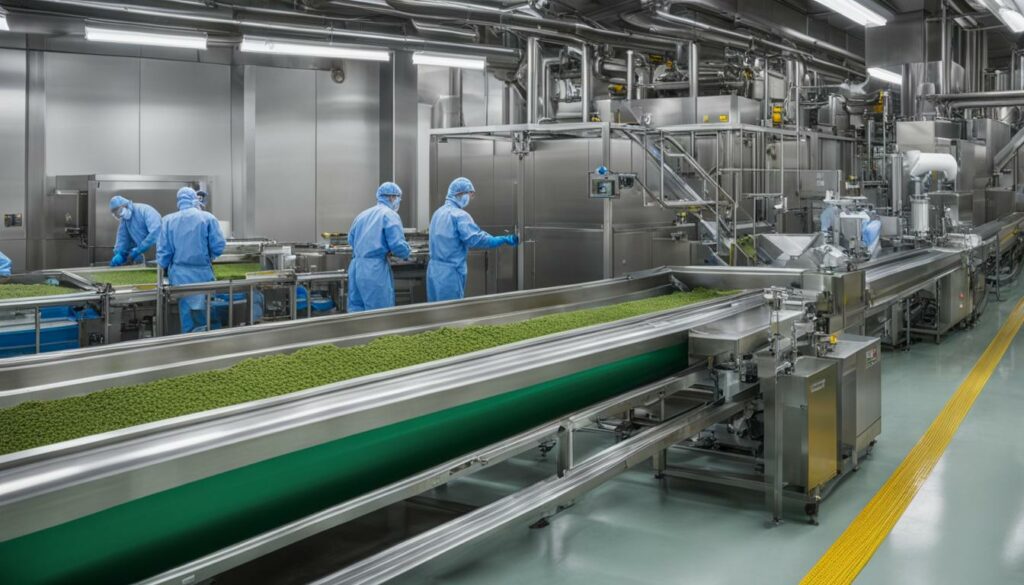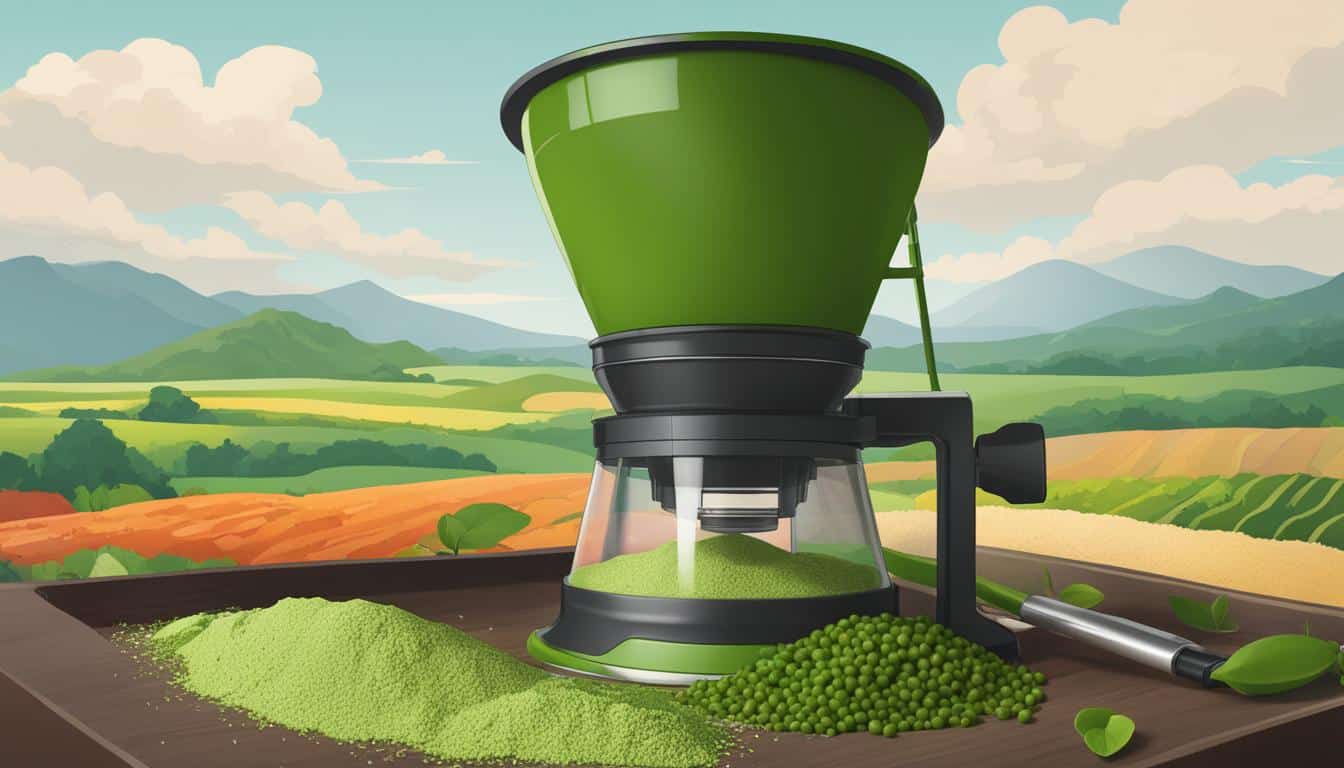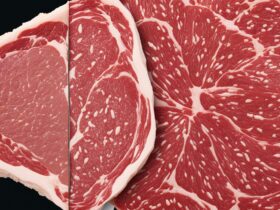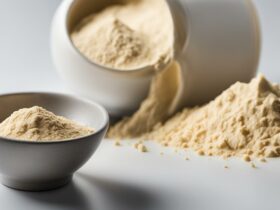Vegan protein powder is a popular choice for those following a vegan or plant-based diet, as well as individuals with allergies or intolerances. Made from plant-based sources like pea, rice, soy, and hemp, vegan protein powders offer a convenient and nutrient-rich option for meeting protein needs.
The process of making vegan protein powder involves extracting the protein source, such as pea protein isolate or hemp protein, through a series of filtration and separation techniques. These powders are highly bioavailable and provide a substantial amount of plant-powered protein in each serving.
Interested in learning more about the manufacturing process and benefits of vegan protein powder? Keep reading to discover all you need to know.
Key Takeaways:
- Vegan protein powders are made from plant-based sources such as pea, rice, soy, and hemp.
- The manufacturing process involves extracting the protein source through filtration and separation techniques.
- Vegan protein powders offer a highly bioavailable and nutrient-rich source of plant-based protein.
- They are a popular choice for vegans, vegetarians, and individuals with dietary restrictions.
- Vegan protein powders provide a convenient way to meet protein needs in a plant-powered way.
The Benefits of Vegan Protein Powder
When it comes to fueling your body with the right nutrients, vegan protein powder offers a wide range of benefits. Whether you follow a plant-based diet or simply want to incorporate more plant protein into your meals, this versatile powder can be a valuable addition to your routine.
One of the key advantages of vegan protein powder is its digestibility. Unlike some animal-based protein powders that can be heavy and difficult to digest, plant protein is gentle on the stomach, making it a great option for individuals with sensitive digestion or dietary restrictions.
In addition to being easily digestible, vegan protein powder provides all the essential amino acids your body needs for muscle growth, repair, and overall health. These amino acids play a crucial role in maintaining and building strong muscles, promoting a healthy immune system, and supporting various bodily functions.
The Power of Plant Protein Sources
Vegan protein powder is sourced from a variety of plant-based ingredients, giving you a wide range of options to choose from. Some popular plant protein sources include:
- Pea protein
- Rice protein
- Soy protein
- Hemp protein
These sources provide not only protein but also other essential nutrients like fiber, vitamins, and minerals. By incorporating different plant protein sources into your diet, you can ensure you’re getting a diverse array of nutrients to support your overall well-being.
Another benefit of vegan protein powder is its sustainability. Plant-based protein production typically requires fewer resources, such as water and land, compared to animal-based protein production. By choosing vegan protein powder, you can make an eco-friendly choice without compromising on nutrition.
Vegan protein powder is a sustainable and environmentally-friendly option compared to animal-based protein powders.
Incorporating vegan protein powder into your diet is not only beneficial for your body but also for the planet. With its digestibility, essential amino acids, and sustainable qualities, plant protein powder can help you achieve your health and fitness goals while making a positive impact on the environment.
Next, let’s explore the detailed process of making vegan protein powder in Section 3.
The Process of Making Vegan Protein Powder
When it comes to vegan protein powder, the process of manufacturing it is a meticulous one that ensures high-quality products. Let’s dive into the steps involved in creating vegan protein powder.
Step 1: Selecting the Protein Source
The first crucial step in making vegan protein powder is selecting the protein source. Common sources include yellow split peas, hemp seeds, rice, and soy. These plant-based ingredients are rich in protein and serve as the foundation for the powder.
Step 2: Removal of the Outer Shell
Once the protein source is chosen, the outer shell, husk, or skin is removed. This process helps to isolate the protein from other unwanted components, such as fiber and starch.
Step 3: Separation of Fiber and Starch
In order to obtain a concentrated protein powder, the separated protein undergoes filtration to remove any remaining fiber and starch. This filtration process ensures a purer protein product with a higher protein content.
Step 4: Filtration and Isolation
Further filtration and isolation techniques are employed to obtain the protein isolate or concentrate. These processes effectively remove any impurities, leaving behind a highly concentrated protein powder.
Step 5: Quality Assurance Testing and Analysis
Before the final vegan protein powders are packaged and ready for sale, they undergo rigorous testing and analysis by a dedicated quality assurance team. This ensures that the powders meet the standards of the manufacturer for quality, purity, and nutritional content.
Step 6: Packaging and Distribution
Once the powders pass the quality assurance tests, they are carefully packaged in suitable containers. The packaging is designed to maintain the freshness and integrity of the product. The finished vegan protein powders are then distributed for sale, ready to be enjoyed by consumers.
By following these meticulous steps, vegan protein manufacturing companies produce high-quality powders that provide individuals with a convenient and nutritious plant-based protein source.

Quality Assurance in Vegan Protein Production
In the production of vegan protein powders, quality assurance plays a pivotal role in ensuring the safety, effectiveness, and overall quality of the products. From the initial testing of raw materials to the final taste testing, each step is carefully monitored to meet the highest standards of vegan protein production.
Upon arrival, raw materials undergo rigorous testing to ensure they meet the specifications, micro-declarations, and compliance with the company’s gold standard. This meticulous testing ensures that only the highest quality ingredients are used in the production process.
The supplier quality assurance teams closely oversee the entire production process from start to finish. They ensure that all products adhere to the same high standards, including packaging materials. This meticulous oversight guarantees that every vegan protein powder leaving the facility meets the expected quality and safety requirements.
The line operators also play a vital role in maintaining manufacturing practices and monitoring for allergens and cross-contamination. They are extensively trained to follow strict protocols, preventing any potential faults or contamination. Their diligence ensures that vegan protein powders are produced in a safe and controlled environment.
Finally, taste testing is conducted to ensure the product meets the desired flavor profile. This stage in the quality assurance process ensures that the vegan protein powder not only meets the necessary nutritional standards but also delivers an excellent taste experience for consumers.
By implementing comprehensive quality assurance measures, vegan protein manufacturers uphold the highest standards to provide consumers with reliable, safe, and high-quality vegan protein powders. This commitment to quality assurance ensures that vegan protein powders are trusted and enjoyed by individuals following vegan or plant-based diets.

Quality Assurance Process Summary:
| Step | Description |
|---|---|
| 1 | Testing raw materials upon arrival for specifications, micro-declarations, and adherence to the company’s gold standard. |
| 2 | Supplier quality assurance teams overseeing the production process to ensure consistent high standards. |
| 3 | Maintaining manufacturing practices and monitoring for allergens and cross-contamination. |
| 4 | Taste testing to ensure the product meets the desired flavor profile. |
Different Types of Protein Powders
Protein powders come in a variety of types, catering to different dietary preferences and needs. The two main categories of protein powders are plant-based and animal-based options. Let’s take a closer look at each:
Plant-Based Protein Powder
Plant-based protein powders are perfect for vegans, vegetarians, and individuals who prefer a plant-focused diet. These powders are derived from a variety of plant sources, such as pea, rice, soy, and hemp. They offer a substantial amount of protein while being free from animal products and by-products. Plant-based protein powders are not only nutritionally rich but also more sustainable and environmentally friendly.
One popular type of plant-based protein powder is pea protein, which is derived from yellow split peas. Pea protein isolate is a complete protein, containing all nine essential amino acids that the body needs for muscle growth and repair. Rice protein, derived from rice grains, is another common plant-based protein powder. Soy protein, made from soybeans, is also widely used and provides a complete amino acid profile.
Animal-Based Protein Powder
Animal-based protein powders, on the other hand, are derived from animal sources, primarily milk. One of the most popular types of animal-based protein powder is whey protein. It is obtained as a by-product of cheese production and contains a high amount of essential amino acids, particularly leucine, which plays a crucial role in muscle protein synthesis.
Whey protein is known for its fast absorption rate, making it ideal for post-workout recovery. It is also rich in branched-chain amino acids (BCAAs), which aid in muscle repair and growth. Additionally, casein protein, another animal-based option, provides a slow and steady release of amino acids, making it suitable for prolonged periods without protein consumption.
| Type of Protein Powder | Main Sources | Nutritional Benefits |
|---|---|---|
| Plant-Based Protein Powder | Pea, Rice, Soy, Hemp | – Suitable for vegans and vegetarians – Complete amino acid profile – Environmentally friendly |
| Animal-Based Protein Powder | Whey, Casein | – High essential amino acid content – Fast or slow absorption rate depending on the type |
When choosing a protein powder, consider your dietary preferences, nutritional goals, and any allergies or intolerances you may have. You can also consult with a healthcare professional or a registered dietitian to determine the best protein powder option for you.
Comparison: Plant-Based vs. Animal-Based Protein Powders
- Plant-based protein powders are suitable for vegans, vegetarians, and those with lactose intolerance, while animal-based protein powders may not be suitable for individuals with these dietary restrictions.
- Plant-based protein powders are typically lower in saturated fat and cholesterol compared to certain animal-based protein powders.
- Animal-based protein powders, particularly whey protein, are known for their rapid absorption and high leucine content, making them advantageous for post-workout recovery and muscle building.
- Plant-based protein powders are often rich in fiber, vitamins, and minerals, offering additional nutritional benefits beyond protein supplementation.
- Both plant-based and animal-based protein powders can be part of a healthy diet, and the choice depends on individual preferences, dietary restrictions, and goals.
| Factors | Plant-Based Protein Powders | Animal-Based Protein Powders |
|---|---|---|
| Dietary Suitability | Suitable for vegans, vegetarians, and individuals with lactose intolerance | May not be suitable for vegans, vegetarians, and those with lactose intolerance |
| Saturated Fat and Cholesterol Content | Lower compared to certain animal-based protein powders | Varies depending on the type of animal-based protein powder |
| Absorption Rate | Varies depending on the plant-based protein source | Fast absorption, particularly in whey protein |
| Leucine Content | Varies depending on the plant-based protein source | High leucine content in whey protein |
| Additional Nutrients | Rich in fiber, vitamins, and minerals | Varies depending on the type of animal-based protein powder |
Conclusion
In conclusion, vegan protein powder is made through a meticulous manufacturing process that begins with carefully selecting the protein source. By using plant-based sources such as pea, rice, soy, or hemp, vegan protein powders provide a sustainable and environmentally-friendly alternative to animal-based protein powders.
The manufacturing process involves extracting the protein from the selected source through advanced filtration and separation techniques. These methods ensure the purity and quality of the protein isolate or concentrate used in the powder.
Vegan protein powders offer numerous benefits, making them a popular choice for people following a plant-based diet or those with specific dietary restrictions. These powders are highly bioavailable, meaning that the body can easily absorb the essential amino acids they provide. Additionally, vegan protein powders are known for being easily digestible, helping to support muscle growth and repair.
By incorporating vegan protein powder into a balanced diet, individuals can enjoy the benefits of plant-powered protein while supporting their overall health and well-being. With different types of protein powders available, each with its own unique production process and nutritional profile, individuals can choose the option that best suits their dietary needs and preferences.
Plant Protein vs Animal Protein: The Complete Comparison Guide
FAQ
How is vegan protein powder made?
Vegan protein powder is made by extracting protein from plant sources, such as peas, rice, soy, or hemp. The protein source undergoes a series of filtration and separation techniques to obtain the protein isolate or concentrate, which is then packaged and ready for sale.
What are the benefits of vegan protein powder?
Vegan protein powder provides easily digestible plant-powered protein, essential amino acids for muscle growth and repair, and is a sustainable and environmentally-friendly option. It can be obtained from a variety of sources, making it accessible to those following a plant-based diet.
How is vegan protein powder produced?
The process of making vegan protein powder starts with selecting the protein source, removing the outer shell, separating fiber and starch, and filtering to obtain the protein isolate or concentrate. The powders undergo testing and analysis by a quality assurance team to ensure high-quality products.
What is the role of quality assurance in vegan protein production?
Quality assurance is crucial in vegan protein production to ensure the safety and efficacy of the products. Raw materials are tested upon arrival, and supplier quality assurance teams oversee the production process. Line operators monitor for allergens and cross-contamination, and taste testing is done to ensure the desired flavor profile.
What are the different types of protein powders?
There are various types of protein powders, including plant-based options like pea, rice, soy, and hemp protein, and animal-based options like whey protein derived from milk. Each type has its own production process and nutritional composition, catering to different dietary needs and preferences.










